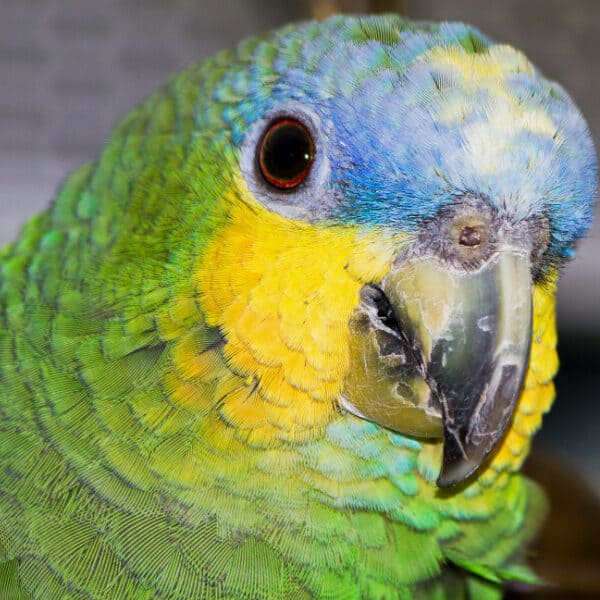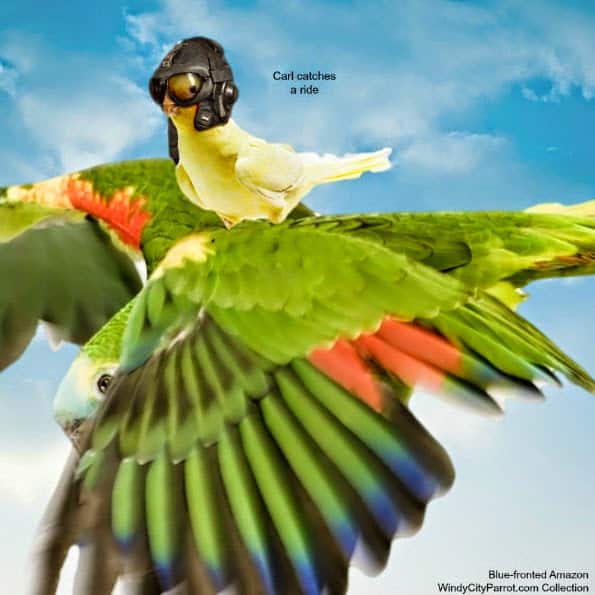Last Updated on by Mitch Rezman
Actually, my dogs are given mostly a raw diet and I supplement a little kibble.
I have to put her away until they’re done or she chases them from their own food :).
Thoughts, please.
Dear Pam
The dirt in your houseplants is more dangerous than the kibble.
Please cover the tops of the pots so they cannot eat the dirt. There can be fertilizers and other toxins in the dirt.
A bit of dog kibble will not harm your birds.
As with everything else, moderation is the key.
Consider upping your bird’s minerals as they may be suffering from PICA which is a shortage of minerals so they will crave dirt and other items to try and fulfill the need.
These products may be useful Hagen Cal-Clay
Hi Catherine
I’m not too concerned about Holly getting into the plants b/c she only gets into the one-pot occasionally and I chase her away so I know she doesn’t get much dirt, but one has to wonder what too much is.
Covering it is another good precaution.
I have asked on my Facebook parrot groups about this but no one has answered this, so thank you for your quick response.
I also wondered about the mineral issue, but my main concern has been about other ‘things’ she might ingest.
I will look into the supplements.
The same is true for the kibble – I always chase her away or am sure to put her in her cage while the dogs eat – again thank you for answering at all.
Just another reason I love Windy City!!
Regards, Pam
I don’t think the dirt is too bad but I would discourage the behavior.
Kibble is in a lot of bird foods renamed as “pellets.
This situation begs the question of what does your bird have to engage with when out of a cage of its own?
Any bird-centric foraging opportunities or toy boxes around the house or garden?
I Luv the Sunday Birdie Brunch.
It helps a lot.
Need help with info for egg-laying.
Huelo, our greenwing Macaw, laid 2 eggs 3 yrs ago.
Now has started laying again and nesting.
Her avian vet says take away right after she lays.
I read about fake eggs when you know she is hormonal.
Well, she is hormonal all the time.
Do you have a suggestion??
Thank u, Sherry C
Hi Sherry
Here’s what we have found that works.
Remove the eggs – no fake eggs.
Take any nesting material/sleeping huts out of her cage.
Keep minimal amounts of food in food dishes so she gets the idea there is not abundant food to feed babies – no food at night.
Lock her in her cage for 3 days, put a full spectrum light on top of it and keep it on for 72 hours – breaks the brooding circadian rhythm.
Let us know if that works for you or if we need to be more proactive.
Chatting with Guest
You: hello how can I help?
Visitor: Hello Mitch, need your advice, please.
You: sure what can I help with?
Visitor: I just returned home after nearly 2 months at the hospital.
My left leg was amputated and I received a liver transplant.
Visitor: Doctors urged me to find a new home for my female Hahns macaw.
Visitor: How shall I approach this so she (4 years old) will be taken care of.
Visitor: It hurts me very much to give her away.
You: By not getting rid of the bird. The doctors are flat out wrong and not knowing anything about birds – the last thing you need is the loss of a pet – hold please I have a post for you.
Visitor: Ok
You: https://windycityparrot.com/doctors-prescribing-pet-birds/
You: please read – had a similar situation with a cancer patient – Birds are like canaries in coal mines for disease and infection.
Visitor: Thank you, Mitch. Let me read it. I will get in touch later. And by the way, I love your new Sunday Brunch newsletter. Very well done.
You: thank you for the kind words – if need be I can send a video on how to make a HEPA air filter for $25 that is as effective as a $1000 unit – the doctors are worried about dander and feces particulate which can be all but eliminated – as long as you can take care of the bird and maybe have someone clean the cage you should be fine.
Visitor: Please send the video.
You: got it will do – anything else?
Visitor: That’s it for the time being. Thank you so much. I am glad that I found your website 3 years ago. Have a great week ahead of you.
You: video should be in your inbox
Sherry C wrote:
I have another question.
Our bird room is on the west side of the house.
Gets warm in this room so I have special blinds and blackout curtains.
The thermostat is in another part of the house so it doesn’t know the temp in the room is 77.9.
Will get hotter this summer.
None of the birds have free flight.
We put in a ceiling fan to circulate the air. The fan is on low. Do I need to be concerned about a draft at night when the door is closed? I can’t find info other than safety and window drafts. Thank you.
Hi Sherry
The problem with “drafts” in the summer is that they may lead to over preening because of “ruffled feathers”
Mitchr
I have a cockatoo and 2 parakeets I have noticed a lot of moths flying around the house.
I have noticed a weevil that looks like a maggot on the wall. Can you tell me a bug spray that can use that won’t kill my birds?
Thank you, Lulabelle
Dear Lulabelle
These Moth Traps will help you out.
To further control the problem keep cages clean and area swept.
Check tray runners and cage corners for moth larvae.
Check your pantry to see if the moths have infested any dry goods, packages of beans, peas, noodles, cereal.
Keep all birdseed in clear plastic containers with lids and store them in a cool dry area. Best to buy no more than you can use in 3 months.
- You can store extra seed double bagged in a fridge or freezer.
- If your bird food has moths or weevils you can recover the seed by putting it all into a deep freeze for 2-3 weeks.
- But if it is webby, it is too far gone, toss it.
- Buy your bird food in smaller amounts.
- Watch expiration dates.
- Clean the cage and the areas around it.
Safe, Enzyme for cleaning poop, daily use, even with the bird on the cage.
For complete heavy cleaning Mango Pet Focus
20% – 25% of parrots are sexually dimorphic meaning you can identify the sex by the color of the bird. Male Eclectus are green – females are red.
Male Indian ringnecks have the ring females do not.
The ring starts to grow in one feather at a time beginning at about 1-1/2 years
Adult budgie hens have a cere that is whitish-blue to deep brown in breeding season.
The most common is a male budgie and has a bright blue cere It may brighten during the breeding season, and then fade.
Sexing lovebirds
This is a female lovebird making “feathers” to line her nest.
Male lovebirds make confetti.
Written by Mitch Rezman
Approved by Catherine Tobsing
Author Profile
Latest entries
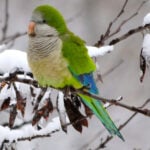 The Traveling BirdJune 26, 2025Can You Name 5 Parrot Species That Are Living Wild in the USA?
The Traveling BirdJune 26, 2025Can You Name 5 Parrot Species That Are Living Wild in the USA?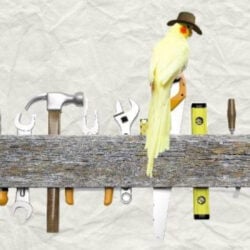 Bird BehaviorJune 26, 2025How is it Parrots Are Problem Solvers Social Animals and Even Use Tools?
Bird BehaviorJune 26, 2025How is it Parrots Are Problem Solvers Social Animals and Even Use Tools?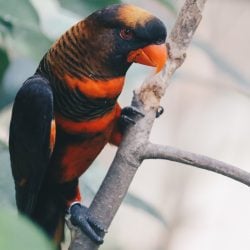 Bird & Parrot AnatomyJune 25, 2025How a Tiny Chemical Modification Makes Parrots Nature’s Living Paintings
Bird & Parrot AnatomyJune 25, 2025How a Tiny Chemical Modification Makes Parrots Nature’s Living Paintings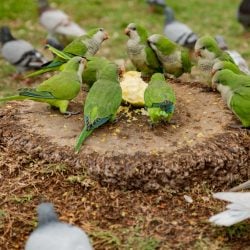 PigeonsJune 20, 2025How Do Parrots Thrive in Cities Outside Their Native Habitats?
PigeonsJune 20, 2025How Do Parrots Thrive in Cities Outside Their Native Habitats?

